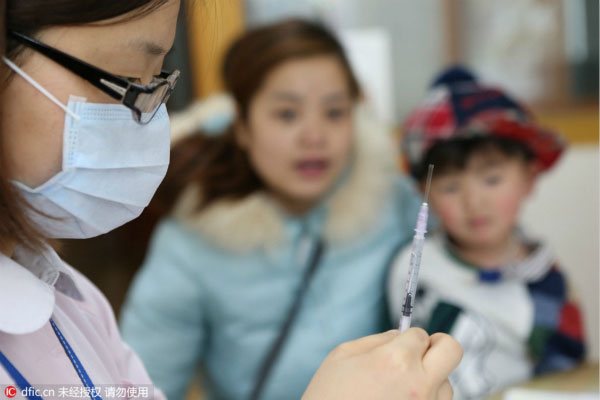 |
|
A Chinese medical worker prepares to vaccinate a young kid at a hospital in Shanghai, China, March 20, 2016. [Photo/IC] |
BEIJING -- The State Council has announced that 357 officials implicated in cases concerning the illegal sale of improperly stored vaccines would be penalized.
They will face punishments including losing their jobs or demotion, according to a decision made at a State Council executive meeting on Wednesday.
So far 192 criminal cases have been filed nationwide and 202 people detained over the scandal, according to a statement issued after the meeting presided over by Premier Li Keqiang.
Last month, the State Council announced a cross-departmental investigation led by Bi Jingquan, head of the China Food and Drug Administration, into improper vaccine trading.
"These vaccine cases impacted many regions... and exposed prominent problems such as inadequate quality supervision and management, delayed discovery and punishment of illegal selling, official nonfeasance and an immature risk management mechanism," said a statement released after the meeting, citing preliminary investigation results.
Risk evaluations involving people having used the vaccines in question must be conducted as soon as possible, with the results publicized in a timely manner and the aftermath handled properly, it said.
"Our country's vaccine system is generally reliable, but any loopholes must be fixed," the statement said, calling for stepped-up efforts to improve supervision for the food and drug industries and a long-term management mechanism catered to vaccine products.
During the meeting, attendees approved a decision to amend a regulation on the management of vaccine circulation and use, stipulating that drug wholesalers will be banned from selling vaccine products outright.
Currently, A-class vaccines covered by the national compulsory immunization program are procured by county-level disease control institutes directly from manufacturers and dispatched to hospitals, all this under the organization of provincial-level disease control organs.
B-class vaccines will also have to be procured this way, according to the decision.
While preventing hospitals from directly contacting vaccine makers and potentially reaching dubious deals, such practices eschew go-betweens and greatly reduce risks in circulation and distribution as the entire process occurs under official arrangements.
A system to track the entire process from manufacturing, storage, transportation to use will be set up, and institutes or hospitals must request storage temperature records upon receiving vaccine products.
According to the decision, fines for those illegally selling or improperly storing and transporting vaccines will be increased. Government officials will be required to resign from their jobs if they fail to perform their supervision duties well.
According to a separate statement released late on Wednesday, as of April 11, 2016, the improper vaccine trading cases involved 45 drug sales groups. The vaccines in question went to 59 health institutions which were preparing to use them.
After examining 19 batches of the confiscated products, an expert team said using these vaccines will not lead to safety risks other than potential normal side effects and they had yet to find vaccines that are not sufficiently potent.
According to the team, those having used the vaccines in question won't need to be re-vaccinated, but they can consult local health institutions if they want to and be re-vaccinated for free.
